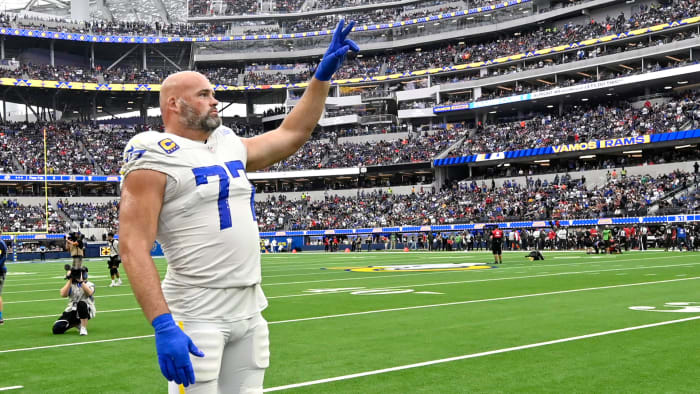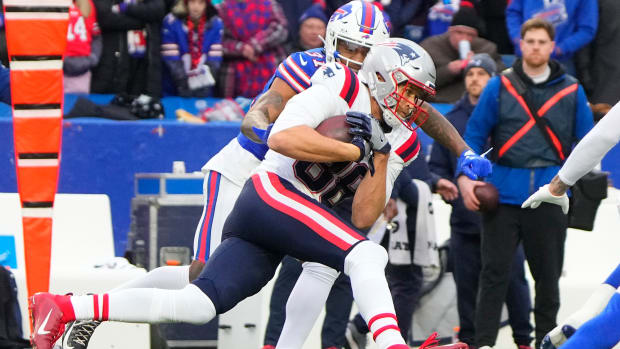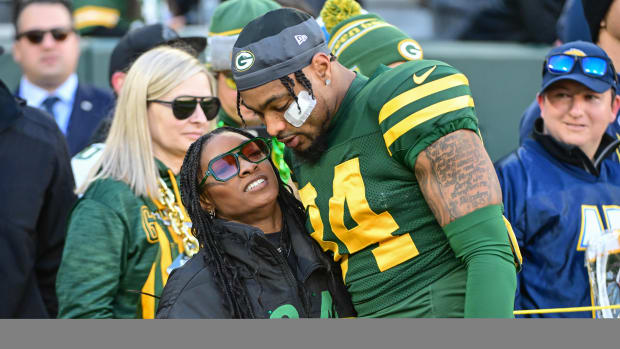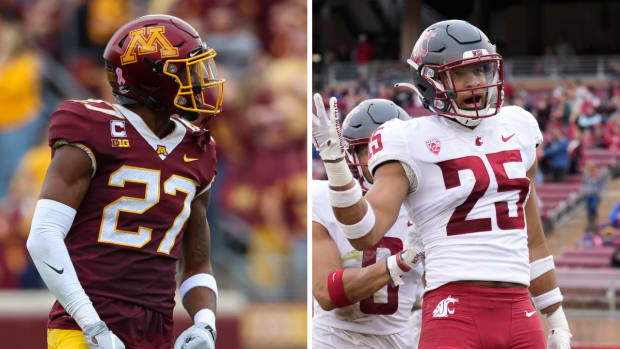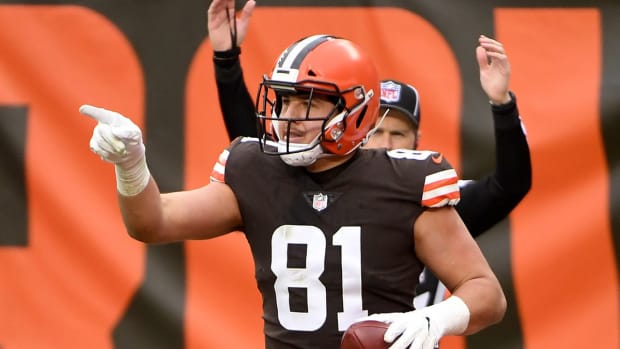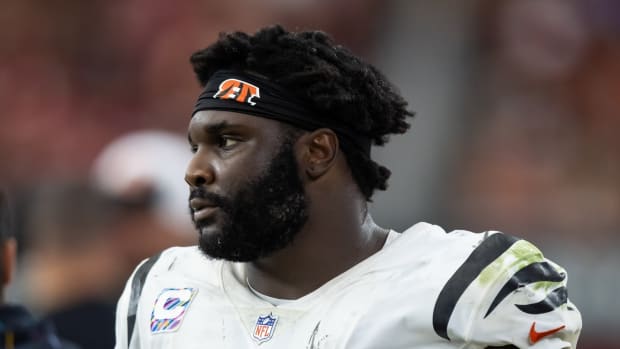Andrew Whitworth and the Wonderful Feeling of Being Very, Very Wrong
For years, Andrew Whitworth told Bengals teammates he would retire. He insisted, every fall, starting around 2011. This is the year, he’d say, I think this is the last one, before inevitably returning for another season—and another season after that, and another season after that. He’s 40 now, the second-oldest nonspecialist in the NFL this season, after that Brady fellow. He’s older, wiser and grayer. He’s closer (maybe, must be) to the end.
With wisdom came perspective, and a cosmic tie that could help him fashion the perfect Hollywood ending, should Whitworth win one more football game and decide to actually stop playing in the coming weeks. Even now, he still can’t say for sure. Instead, he’s grateful for the understanding borne from a changed perspective. He’s looking back now at 2017 specifically, when, after 11 seasons as a Bengal had netted zero playoff victories, he needed change. It started with a flight, an acceptance, a voicemail and the eventual realization that one assumption he made that fateful spring had been both terribly and gloriously wrong.
Whitworth owes his 16th season—and, by extension, his second Super Bowl appearance—to that spring and the sequence that unfolded. He had always expected to retire as a Bengal until he didn’t. His exit wasn’t messy; that’s not his style. But there was frustration. There were hard feelings. He tried to forget all that on his free-agent visit to Los Angeles that March.
As he sat next to his wife, Melissa, on the plane, he painted a realistic picture. “You realize my dreams of winning the Super Bowl are over,” he started, pointing out the franchise had just hired a young, wunderkind, first-time head coach in Sean McVay. Whitworth was two years older than his potential new boss. The Rams had just stumbled to a 4–12 record in 2016, dismissing Jeff Fisher during the season. They ranked among the youngest teams in the league. If Big Whit, as he’s known, chose L.A., he would essentially be swapping losing for more losing, moving from a team that last seized a postseason victory in 1990 to one that last claimed a playoff win in ’04. “I’d be going to L.A. to help rebuild that locker room and bring a veteran presence,” he said.
Melissa nodded and said something about a new adventure. Internally, she thought, “That’s really sad.”
The visit went well, right from the start. Whitworth hit it off with McVay, and he agreed to become the franchise’s new left tackle and elder statesman. He missed a call from his new (and younger) coach en route to the airport for his return flight. But he saved the voicemail that McVay left, because it meant that much. McVay had plans, dreams, Super Bowl aspirations, and he laid them out so passionately and then connected how Whitworth fit within the framework he envisioned so precisely that Whitworth’s confidence surged.
He found the message to be “square” and “cheesy” but also remarkable, all at once. He knew right then he had made the right decision. He felt reenergized. He sometimes studies one picture from that time, not long after his visit, when he went to Rams headquarters in Thousand Oaks for a press conference to announce two signings. The image features him, his two boys and a fellow newbie, wideout Robert Woods, who had left Buffalo to join the Rams. One son wore a Whitworth jersey, No. 77; the other, a Woods jersey, No. 17. The signees both donned blue suit jackets, already in sync. They were the first free agents to join McVay in a new era of Rams football: back in Los Angeles, grappling for a city’s divided attention, beckoning fans who still felt spurned by their move to St. Louis back into the fold. External expectations were low; internal plans, ambitious.
“I believe we were destined to meet each other,” Whitworth says now.
In January, the football universe began to reveal the cosmic tie. Both franchises that Whitworth played for made the playoffs. And the same weekend the Bengals outlasted the Raiders in the wild-card round, their former coach flew to Los Angeles to visit an old friend.
Marvin Lewis stayed with the Whitworths that weekend and attended their thumping of the Cardinals—despite four decades as a coach, that marked the first game he had ever attended as a “fan.” Whitworth and his family meant that much to Lewis. “He was such a special part of our program there,” Lewis says. “From the time we drafted him to the lockout and everything else, he was an extension of our coaching staff, and he played at a very, very high level.”
The Bengals selected Whitworth in the second round of the 2006—yes, 2006—NFL draft. They expected him to block, make pancakes of defenders and protect Carson Palmer. They didn’t expect the immediate leadership that Whitworth provided, which Lewis describes as an innate pied-piper-like ability to draw others into his orbit and push everyone toward the same goals.
In that wild-card win over Arizona, Whitworth came down with right knee and ankle injuries. But even that day, with his upcoming availability in doubt, Whitworth, his wife and Lewis considered a potential and enticing matchup on the near-ish horizon. They couldn’t help but wonder about an unlikely scenario. What if the Bengals and the Rams advanced to Super Bowl LVI? What if Whitworth, in what could, might, should be his final season, met the franchise he spent a decade-plus pushing toward the Super Bowl in the Super Bowl and in his final game? What if he won? As farfetched as it sounded, Melissa hoped for that exact scenario. As both teams won two more playoff games what once seemed farfetched became reality, Whitworth’s present against his past, one having steeled him for the other.
“It’s kind of a fairy-tale story,” Lewis says.
Whitworth understands that many view his Cincinnati tenure as a failure. But the Bengals weren’t the Lions when Whitworth played there; in order to lose six postseason games they had to make the playoffs six times between 2009 and ’15. Sixteen seasons spent toiling toward a championship in pro football taught him to accept the fickle nature of postseason runs. The Bengals collapsed late in some years, due to injuries; lacked talent in other seasons; lost Palmer in ’11; and drafted quarterback Andy Dalton (’11) and receiver A.J. Green (also ’11). “We actually won a ton of games,” Whitworth says. “We had some really good teams. We just never found a way to win a playoff game and make that Super Bowl run.”
Outsiders, pundits, all the jokesters lobbing barbs about playoff futility on social media, they could have their fun at his expense. He couldn’t expect any of them to understand the difficulty inherent in that kind of streak. It was hard to win one game, let alone enough to play in meaningful ones every January. And there were years, like in ’15, when a team with legitimate Super Bowl hopes lost Dalton to a fractured thumb in mid-December. The Bengals couldn’t control a freak fracture that’s simply part of football, all the collisions and violence necessary for every play.
The Whitworths are careful about how they characterize the departure now. A strong bond with Cincinnati and the franchise remains. They don’t want to offend the Bengals. But they were hurt, because of those bonds and all they had invested. Melissa does say, “It wasn’t all s---s and giggles; it wasn’t all pleasant. There were some hurt feelings, especially on our end. There were some decisions made where they believed Andrew didn’t have much left, and it’s clear that’s not true now. It could’ve been handled better.”
Melissa is quick to clarify that she doesn’t want to come across as bitter. She believes her husband will one day be in the Bengals’ Ring of Honor. She considers her family “fans” of Joe Burrow, Zac Taylor and Ja’Marr Chase. On most Sundays, anyway. Just not this next one.
It wasn’t an ideal existence in Cincinnati—otherwise, Whitworth wouldn’t have left. But the important part, to him, was what he carried with him to Los Angeles: 11 seasons’ worth of lessons, nuances and insights. His measured approach to football helped McVay evolve. They held several conversations in which Whitworth emphasized to his coach that the Rams would mimic McVay’s response to wins and losses. He needed to stay more in the middle in terms of temperament, never elated and never despondent. Celebrate victories and move on. Lament losses and move on. That mindset helped as the Rams moved all over California that season, holding training camp in Orange County, preparing during the season in Thousand Oaks, playing “home” games in The Coliseum while workers built the palace now known as SoFi Stadium. They didn’t have much of a “home” crowd, and there were times when they needed to utilize a silent snap count at The Coliseum. McVay’s steadiness, bolstered by an assist from Whitworth, made a chaotic time period less so.
In fact, the duo made the playoffs in their first season together. The Whitworths watched the Rams develop under McVay. They welcomed the moves that general manager Les Snead made to strengthen the roster, all the draft picks traded for higher draft picks and elite talent signed. “They are really wanting to win now,” Melissa told her husband one night. “I was so wrong,” he told her.
In Whitworth’s second year with the Rams, 2018, they advanced to Super Bowl LIII, way ahead of schedule. Before they clashed with the Patriots for the one title Whitworth wanted most, he finally told McVay what he had said to his wife on that flight to L.A. the year before. That day in Atlanta, Melissa was standing next to him, and she saw McVay shoot her husband a smirk, eyebrows raised in mock amusement. “Why did you say that?” he asked lightheartedly.
Whitworth shrugged. “I had no idea how this was going to play out,” he responded.
By that point, the dynamic between Whitworth and McVay would have made for a buddy comedy on Netflix: the huge and older player contrasted with the smaller and younger coach. “Like the movie Twins,” McVay joked. “I guess he’s Arnold [Schwarzenegger], and I’m Danny DeVito.
“I can’t put into words how important he [has] been to our team,” McVay told Sports Illustrated the night before their first Super Bowl, taking a break from his final preparations. “The relationship I’ve been able to develop with him is something I’ll cherish for the rest of my life.”
As both look back at Feb. 3, 2019, they lament mistakes that the Rams made. The biggest weren’t specific plays, series or quarters in their 13–3 loss. When they analyze the game, they believe their biggest miscue was how they utilized the two weeks before kickoff. They prepared too much, and lasered their focus for too long, which made players and coaches tight and overcomplicated the game plan. When the Patriots shut down their rushing attack, the Rams failed to adjust in any meaningful way. The Whitworths skipped the party in Atlanta that night. So did the McVays.
Andrew considered retirement once, came back yet again and wondered, because he had to: Was his best chance at winning an ever-elusive championship behind him?
The Rams continued to build. In came Jalen Ramsey. Here came Cooper Kupp and Woods. Aaron Donald, there before Whitworth arrived, entered another stratosphere in terms of his level of dominance. While strengthening their team, McVay and Whitworth often dove into philosophical discussions. In one, they considered elements from The Culture Code, a book that lays out “secrets” of highly successful people. McVay asked Whitworth: Does vulnerability lead to trust? Or is it the other way around? Vulnerability, they decided, led to understanding, which led to depth, which led to unshakable conviction. They tried to imprint that on the Rams. “I would say, in all sincerity, I don’t know that I’ve ever met a more empathetic person,” McVay says of his starting left tackle. The coach even tolerates what he describes as an unusual bearing for an offensive lineman: all the Jordans, the style, the dance moves. “He’s a high-maintenance offensive lineman,” McVay jokes. “He’s an L.A.-swaggy guy. He’s too swaggy, really, to be an O-lineman.”
McVay agrees with Whitworth’s sentiment. He, too, thinks they were destined to meet.
The Rams entered the season with renewed championship hopes. They stemmed, in large part, from trading Jared Goff (and draft picks) to the Lions for Matthew Stafford. This proved awkward for the Whitworths, who consider Goff part of their family, a close and dear friend. Both cite the class Goff showed in the aftermath of the deal, in public settings and in private moments, like the congratulatory text message he sent them after the Rams’ triumph over the 49ers in the NFC championship. It read: Hey you guys, I know this one will be a special one for you versus the old team. Amazing how things happen and I love you.
The rest of the season didn’t unfold as smoothly. A 7–1 start also included a blowout defeat against the Cardinals that cast doubt on whether the Rams could continue their NFC West supremacy under McVay. Worse yet, three losses followed. “November,” Melissa says, “was a rough month.”
In December, a COVID-19 outbreak spread through team headquarters. At least 29 players were infected, including Whitworth, who tested positive for a second time. But even though Whitworth would be injured in the playoffs, he could see the Rams morphing back into the team they were when the season started. The addition of Von Miller helped, as did the signing of Odell Beckham Jr.
Whitworth believes Kupp’s campaign ranks as the best-ever single season for a receiver in NFL history. … He thinks Donald will be remembered as the top defensive player of all time and saw him become a more vocal leader this season while somehow raising his level of dominance. “Like trying to block a windmill,” he says. … He praises Woods—remembering the photo from 2017—for how Woods handled a torn ACL in mid-November and his father’s sudden death two weeks ago, how he stayed around the team, trying to be impactful, helping the Rams prepare for a run he could not make with them.
He knows that McVay read Stillness Is the Key, a book on stoic and Buddhist philosophy, this offseason, because McVay sent him a copy, too. “There is no doubt that this is probably the most stillness I’ve ever seen in him since I’ve known him,” Whitworth says, while emphasizing that the Rams have taken a more typical approach to Super Bowl week, treating it like their other games, not deviating from their routines.
To that end, the Whitworths continued their tradition from this season as the Super Bowl approached. They ate breakfast on the Tuesday after their NFC championship game victory with the Staffords and Kupps. On that particular week, they reminisced, laughed and cried, the “breakfast” stretching into a full, 12-hour hang. “We had all the emotions,” Melissa says, “and we were in bed by 9.”
Whitworth believes the Rams returned to the Super Bowl because of the standard he helped set, because of the urgency he created and because he plays for a coach who believed, even when Whitworth himself did not, from the very moment they met. Now he hopes that’s enough to topple his old team and win a championship, scripting an ideal end to an improbable career.
Another coach Whitworth played for in Cincinnati knows his old tackle wants to win. “Andrew Whitworth was the reason why [I] went to a lot of playoff games,” says Hue Jackson, a longtime Bengals assistant and coordinator under Lewis who is now the head coach at Grambling State. “He always had so many players at his house. I’ll always have a soft spot for him.”
When Super Bowl LVI kicks off in Los Angeles, at SoFi, on Sunday afternoon, Whitworth will be older than both head coaches. He still could return for another season, but that seems unlikely. He would turn 41 next December, ancient by pro football standards. Melissa hopes he’s done, but she won’t project, having long ago learned not to do that. “Ask him that,” she says, with a small edge detectable in her voice. “I thought he was going to retire for the last eight years. It wouldn’t matter what I told you. It’s probably going to be wrong.”
Of all the Rams have to play for—fame, celebrity, money; the franchise and its return; Donald and the only “accomplishment” he needs to complete an all-time résumé; Stafford and the ring he never had a chance to win in Detroit—Whitworth ranks near the top. Had he not taken that flight to Los Angeles, not made an assumption and not been so terribly wrong, he wouldn’t be here, perfect ending close enough to touch.
More NFL Coverage:
• From 2020: The Tao of Whit, O-Line Life and the Injury Aftermath
• For Eric Weddle, It Was (Apparently) Never Over
• SoFi Stadium Went Up—and Then Everything Changed
• Cooper Kupp’s Unique Approach




































